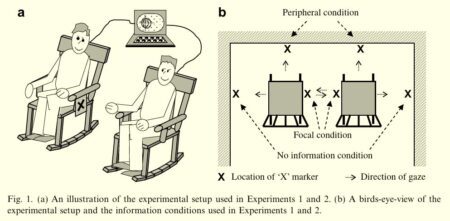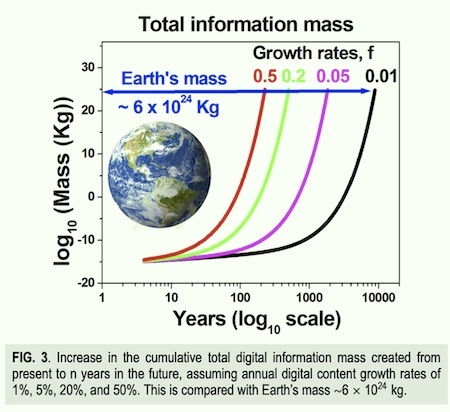Marc Abrahams's Blog, page 107
August 19, 2020
Pocket-Sized #1032: “Ice Cream & Dr. Land”
Ice Cream & Dr. Land
In this special Pocked-Sized episode #1032, Marc Abrahams extracts some some flash-frozen bits of history from techno-sociologist Gus Rancatore, proprietor of Toscanini’s Ice Cream.
Today, Gus shares with us his chance run-ins with Polaroid’s Dr. Edwin Land.
Remember, our Patreon donors, on most levels, get access to each podcast episode before it is made public.
Seth Gliksman, Production Assistant
Available on Spotify, Apple Podcasts, Overcast, Google Podcasts, AntennaPod, BeyondPod and elsewhere!

August 18, 2020
Information Pleas: A Calculated Expectation of Catastrophe
Physics knowledge can lead an energetic, too-voluminously-informed person to have real and/or imagined worries — massive worries — about the future. This new study, published in digital form, may or may not make that clear.
The study is: “The Information Catastrophe,” Melvin M. Vopson [formerly Dr. Vopsaroiu], AIP Advances, vol. 10, no. 085014, 2020. (Thanks to Tim Radford for bringing this to our attention.) The author, at the University of Portsmouth, UK, explains:
Currently, we produce ∼1021 digital bits of information annually on Earth. Assuming a 20% annual growth rate, we estimate that after ∼350 years from now, the number of bits produced will exceed the number of all atoms on Earth, ∼1050. After ∼300 years, the power required to sustain this digital production will exceed 18.5 × 1051 W, i.e., the total planetary power consumption today, and after ∼500 years from now, the digital content will account for more than half Earth’s mass, according to the mass-energy–information equivalence principle. Besides the existing global challenges such as climate, environment, population, food, health, energy, and security, our estimates point to another singular event for our planet, called information catastrophe….
These issues are valid, regardless of the future developments in data storage technologies. In terms of digital data, the mass–energy–information equivalence principle formulated in 2019 has not yet been verified experimentally, but assuming this is correct, then in not the very distant future, most of the planet’s mass will be made up of bits of information.

August 17, 2020
“The Secrets of the Bags”– an Ig Nobel Prize favorite moment
This historic Ig Nobel Favorite Moment video stars Sabine Begall, who shared an Ig Nobel Biology Prize for documenting that when dogs defecate and urinate, they prefer to align their body axis with Earth’s north-south geomagnetic field lines. Thanks to Mila Joana Mesquita Rodrigues (Miss Sweetie Poo).
The Ig Nobel Prizes honor achievements that make people LAUGH, then THINK.
Perhaps once more in German?:
The 30th First Annual Ig Nobel Prize Ceremony will be webcast September 17, 2020 at www.improbable.com.
Coordinator, Narrator, & Typist: Seth Gliksman

The ‘Rocking Chair Paradigm’ [study]
In 2007 (or thereabouts) researchers from Colby College, US, the University of Connecticut, US and the College of the Holy Cross, US, jointly came up with the ‘Rocking Chair Paradigm’.

The paradigm provided a new method to investigate whether, in some situations, people are prone to (consciously or unconsciously ) synchronize their movements with each other. The paradigm differs from previous methodologies (e.g. using swinging pendulums*) in that the experimental participants don’t have to be instructed to oscillate – they like doing it, and so they do it anyway.
“Clearly, the specific predictions of the coupled oscillator model used to understand within and between person coordination mean that the rocking chair paradigm could offer a powerful way of systematically examining the relationships between interpersonal coordination and the social psychological aspects of interpersonal interaction. Moreover, by drawing on dynamical systems theory, the rocking chair paradigm should help in uncovering the degree to which interpersonal interaction itself needs to be understood as a dynamically constrained self-organized process.”
See : Rocking together: Dynamics of intentional and unintentional interpersonal coordination in Human Movement Science, Volume 26, Issue 6, December 2007, Pages 867-891. A full copy of which may be found here.
* Note: Or, if you prefer, pendula.
Research research by Martin Gardiner

August 16, 2020
“My Angry German”– an Ig Nobel Prize favorite moment
This historic Ig Nobel Favorite Moment video stars Jean Berko Gleason, who delivered the traditional “Welcome, Welcome” speech in many Ig Nobel ceremonies.
The Ig Nobel Prizes honor achievements that make people LAUGH, then THINK.
The 30th First Annual Ig Nobel Prize Ceremony will be webcast September 17, 2020 at www.improbable.com.
Coordinator, Narrator, & Typist: Seth Gliksman

August 15, 2020
Pocket-Sized #1031: “Another Look at Who Can Touch Whom”
In this Pocket-Sized episode #1031, Marc Abrahams shows an unfamiliarly familiar research study to Jean Berko Gleason. Dramatic readings and reactions ensue.
The research mentioned in this episode is featured in the special Psychology issue (vol. 26, #1) of the Annals of Improbable Research magazine.

Remember, our Patreon donors, on most levels, get access to each podcast episode before it is made public.
1. Jean Berko Gleason encounters:
“Topography of social touching depends on emotional bonds between humans,” Juulia T. Suvilehto, Enrico Glerean, Robin I. M. Dunbar, Riitta Hari, and Lauri Nummenmaa, Proceedings of the National Academy of Sciences, epub 2015.
Seth Gliksman, Production Assistant
Available on Spotify, Apple Podcasts, Overcast, Google Podcasts, AntennaPod, BeyondPod and elsewhere!

“She Looked Aghast”– an Ig Nobel Prize favorite moment
This historic Ig Nobel Favorite Moment video stars Joe Wrinn, former head of the Harvard University News Office.
The Ig Nobel Prizes honor achievements that make people LAUGH, then THINK.
The 30th First Annual Ig Nobel Prize Ceremony will be webcast September 17, 2020 at www.improbable.com.
Coordinator, Narrator, & Typist: Seth Gliksman

August 14, 2020
“A Shower of Paper Airplanes”– an Ig Nobel Prize favorite moment
This historic Ig Nobel Favorite Moment video stars Alessandro Pluchino, who shared an Ig Nobel Management Prize for demonstrating mathematically that organizations would become more efficient if they promoted people at random.
The Ig Nobel Prizes honor achievements that make people LAUGH, then THINK.
For those with a bent for Italian:
The 30th First Annual Ig Nobel Prize Ceremony will be webcast September 17, 2020 at www.improbable.com.
Coordinator, Narrator, & Typist: Seth Gliksman

Food Adventure: Watch an explosion-puffing machine in action
This US government video, called “Quick-Cooking Foods by Explosion Puffing,” shows “the ‘explosion puffing‘ food dehydration process. This process yields a porous dehydrated vegetable or fruit product that rehydrates more rapidly than heat-dried or freeze-dried foods, and has better retention of quality (color, texture, flavor)”.

August 13, 2020
“To Bring Umbrellas”– an Ig Nobel Prize favorite moment
This historic Ig Nobel Favorite Moment video stars Bruce Petschek, who directed the videography at most of the Ig Nobel ceremonies
The Ig Nobel Prizes honor achievements that make people LAUGH, then THINK.
The 30th First Annual Ig Nobel Prize Ceremony will be webcast September 17, 2020 at www.improbable.com.
Coordinator, Narrator, & Typist: Seth Gliksman

Marc Abrahams's Blog
- Marc Abrahams's profile
- 14 followers




